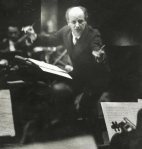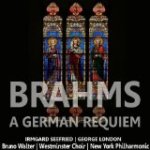 It’s odd to look into a book on Brahms and the German Spirit and not find either Nietzsche or Hegel represented there. I like much of what Daniel Beller-McKenna has to say and his careful examination of Wilhelm Furtwängler’s 1933 Brahms address was especially useful. I’d never heard of the rumour flying about Nazi Germany that Brahms was Jewish, and the need both to quash it and make clear it didn’t matter either way. To extract just a few lines from what Furtwängler had to say: ‘Brahms belonged to that race of Germanic musical giants which begins with Bach and Handel, is carried forward by Beethoven, and in which a colossal physical power is combined with the greatest tenderness and sensitivity….He was able to accomplish what he did by the strength of his Germanness…He could be nothing else; and if his heart was open to all sorts of inspirations from beyond Germany…his Germanic nature instinctually sought to overcome and subdue these influences. His art, in its bitterness and sweetness, in its apparent exterior hardness and inner resilience, in its imagination and abundance as in its self-discipline and compactness, is German. He was the last musician to reveal to all the world’s eyes, with undeniable clarity, the greatness of German music.’ Might rhetoric, understandably suspect for its date, but not to be construed as Nazi: that at least is my view.
It’s odd to look into a book on Brahms and the German Spirit and not find either Nietzsche or Hegel represented there. I like much of what Daniel Beller-McKenna has to say and his careful examination of Wilhelm Furtwängler’s 1933 Brahms address was especially useful. I’d never heard of the rumour flying about Nazi Germany that Brahms was Jewish, and the need both to quash it and make clear it didn’t matter either way. To extract just a few lines from what Furtwängler had to say: ‘Brahms belonged to that race of Germanic musical giants which begins with Bach and Handel, is carried forward by Beethoven, and in which a colossal physical power is combined with the greatest tenderness and sensitivity….He was able to accomplish what he did by the strength of his Germanness…He could be nothing else; and if his heart was open to all sorts of inspirations from beyond Germany…his Germanic nature instinctually sought to overcome and subdue these influences. His art, in its bitterness and sweetness, in its apparent exterior hardness and inner resilience, in its imagination and abundance as in its self-discipline and compactness, is German. He was the last musician to reveal to all the world’s eyes, with undeniable clarity, the greatness of German music.’ Might rhetoric, understandably suspect for its date, but not to be construed as Nazi: that at least is my view.
In a talk I gave recently on BBC Radio Three I unconsciously echoed some of Furtwängler’s sentiments, for instance about the power of form in Brahms over a surging emotional content, and about a very strong will to translate Nature into an Idea. I traced an intellectual and artistic lineage back through the German Romantics to Goethe and ultimately to Spinoza, who first stated for the modern world that Nature and God were two aspects of the same reality.
I’d like just to add here what I didn’t have the time and space to include in my broadcasts.
Jan Swafford in his 2004 Johannes Brahms repeats the established view, and rightly so, that A German Requiem (1868) is uniquely a mass for the living, unlike the great Catholic masses for the dead of Mozart and Berlioz and Verdi. It is sung not in Latin but in German. Brahms, mindful of the death of his beloved Robert Schumann twelve years earlier, and his own mother in 1861, selected passages from Luther’s Bible that comforted those who live on. The opening words of the seven sections, from ‘Selig sind, die da Leid tragen’: ‘Blessed are those that bear troubles’, to ‘Teach me, oh Lord’, ‘You have now your sadness’ and ‘We have no permanent condition on earth’ speak in the vernacular to lives afflicted by hard work and early mortality. The corresponding verses from the King James Bible are ‘Blessed are they that mourn’, ‘Lord make me to know…’ ‘Ye now are sorrowful’ and ‘Here on earth we have no continuing place’. But I think you can see that in some cases the German is even more direct.
I remember one of my teachers of the history of music being astonished when I told him this work was the great musical representation of German Protestantism. Beller-McKenna certainly makes that case. But it’s a pity he couldn’t draw in Hegel to back it up. Was there ever a greater German philosopher? Kant was more sound, and more useful to philosophy as a sober universal discipline. But Hegel was a German colossus who drew history and art and psychology into philosophy in an unprecedented burst of humanist self- confidence. He thought the human mind and heart were capable of a quasi-religious self-transcendence on behalf of humanity as whole. Of course he was writing about the world he knew, of northern Europe in the early nineteenth century. Anxious at the way Enlightenment reason had stripped out the spiritual joy of a humble north European life, he wrote, in 1802, in his Faith and Knowledge, of ‘the beautiful subjectivity of Protestantism’ and of ‘the poetry of Protestant grief’ in contrast to ‘the prose of satisfaction with the finite’. Well, isn’t that exactly what Brahms managed to capture in his German Requiem sixty years later? 
Hegel wrote about the civilizing power of yearning, of Sehnsucht, which of course also lies at the heart of Brahms’s religious and romantic depictions of longing. I’ve just been listening to Bruno Walter’s Requiem with the New York Philharmonic and the Westminster Chamber Choir in 1954, on the original vynyl: one of the finest ever recordings, with its none-too-slow and beautifully varied tempi. In passing I must also nod to Theodor Adorno who reminded us (in Paralipomena) we should be listening to the early Brahms, with its unparalleled tenderness. From the Op 18 String Sextet (1860) through the Cello Sonata Op 38 (1862-65) to the Requiem (properly dated 1857-68) you can for instance, trace a theme of deep maternal love and the continuing need for it in the adult heart. The sentiment is one of longing merged with filial and ultimately religious piety. 
Nietzsche, another name missing from Beller-McKenna’s book, didn’t particularly like Brahms’s music, but he often felt the need to characterize it in the terms that mattered to him: of the rise of a middlebrow and middle-class philistinism he associated with Bismarck’s first German Reich. Nietzsche was well aware of the extent to which Brahms was set up as as a contrast to and ideological opponent of Wagner, against certain marked similarities in their music. Public squabbling between the two camps urged him to make his own distinctions. Brahms for instance was as a sentimentalist but not play-acting in his music, unlike Wagner. To hunt down the references in the Kritische Studienasugabe (KSJ, vols 6,7, 8, 11 and 12) presents an interesting, not much discussed picture. I’m sorry I didn’t manage to mention Brahms in Nietzsche in Turin.)
Nietzsche in 1874 homes in on the negative usefulness of Brahms to Wagner, as an other he just won’t tolerate (akin, as Nietzsche saw it, to Wagner’s treatment of Nietzsche himself). It’s sometimes said Nietzsche didn’t care for the music of Brahms, but a note in Summer 1878 strikes an unexpectedly subtle and sympathetic note, anticipating Beller-McKenna’s book entirely: ‘Brahms’s music is the most salutary phenomenon, in which more German blood flows than in Wagner’s — and with that I mean to say a great deal of good, although in no way only good.’ The limit for Nietzsche vis a vis the Protestant and patriotic Brahms was the degree to which he was adopted by that philistine new nation beating its breast with national cultural pride. But he can separate his man from the cult around him, and in June-July 1885, despite qualifications regarding the piety, concedes that Brahms truly earns the designation ‘north German musician’.
The most detailed attempt to come to terms with Brahms’s music, however, comes in the Second Afterword to ‘The Case of Wagner’ –one of the key essays of Nietzsche’s last sane year, 1888. Given Wagner’s total dominance of the German music scene, ‘what is the point any more of Johannes Brahms?’ Nietzsche asks. ‘His good fortune was a German misunderstanding – people took him as Wagner’s antagonist – an antagonist was needed! That doesn’t make for necessary music, only and above all for too much music! If one is not rich one should be sufficiently proud to be poor. The sympathy that Brahms undeniably conduces, quite independently of that ideological quarrel, that business of biases and prejudices [the quarrel over Wagner’s New German music and Brahms’s absolute music, as stoked by anti-Wagnerian critics], was for a long time a mystery to me: until finally, almost by chance, I got the hang of it, that he has his effect on a certain type of person. He has the melancholy of incapacity; he doesn’t create out of fullness, he longs for fullness. If one sets aside what he imitates, what he takes from old and great and exotic-modern styles and forms – and he is a master of the copy – then one can see that his ownmost quality is longing [Sehnsucht]…And that is what those full of longing, unsatisfied people of every kind, recognize. He’s too little a person, too little a central point …That is what people without personality [die “Unpersönlichen”], peripheral people understand and they love him for it. In particular he is the musician for a type of unsatisfied women. Fifty paces on and you get the lady wagnerian – just as fifty paces on from Brahms you find Wagner – the lady wagnerian being a much more definite and interesting and above all more charming type. Brahms is moving, so long as he secretly enthuses or mourns for himself – in that degree he’s “modern” -; he grows cold, he doesn’t mean anything to us any more as soon as he inherits the classics. People like to call Brahms the legatee of Beethoven. I don’t know any more cautious euphemism. Everything in music today that lays claim to a “grand style” is by that token false towards us or false towards itself. This alternative quite makes one think: it contains within itself a casuistic argument over the worth of the two instances. “False towards us” – most people protest against that, they don’t want to be deceived; I myself freely admit I prefer this type to the other kind (“false towards itself”). That is my taste. To put it more clearly, for the “poor in spirit”: Brahms or Wagner…Brahms is not a play-actor. One can subsume a good many other musicians under the concept Brahms.’
Nietzsche concludes this stunning mini-essay (in my translation): ‘But nothing can cure music in the main today from what is the main problem, from fatalism, from being the expression of a physiological contradiction, from being modern. The best teaching, the most conscientious schooling, intimate acquaintance with and even confinement to the company of the old masters – all that is only a palliative, more exactly, illusory, because one no longer has the disposition for it in one’s body: whether we’re talking about the strong breeding of a Handel, or the overflowing animality of a Rossini….What we in the best of cases can experience are exceptions. From the rule that the rot sets in from above and that it is fatalistic no god can rescue music.’
I hardly need say that this is extraordinary writing . In short it rehearses Nietzsche’s fear of music that is too emotional, in a way that only succeeds in crippling the will of the listener, rather than exciting and inciting him or her to live fully. It echoes Nietzsche’s own dilemma over Wagner, that terrible feeling of being overwhelmed and undermined in his will to live – to succeed on his own terribly freighted terms – that causes him to look around at the alternatives, and in the end to reject Brahms too. In both cases it’s worth noting that Nietzsche, the forerunner of and inspiration for Freud, is dismayed by the rerouted sexuality, whether overt or repressed, he finds in the music of both Wagner and Brahms.
In the other talk I gave on Radio 3 recently, on Brahms and Freud, I discussed Brahms’s sexuality, which I suppose Nietzsche thought was too much on display. In any case Nietzsche’s pithy indictment of Brahms’s ‘melancholy of incapacity’, eine Melancholie des Unvermögens, which has sometimes been translated as ‘a melancholy of impotence’, has helped bolster the case of critics who have wanted to find an unfulfilled sex life in his music.
To which two final things. One is I think Adorno directly replied to Nietzsche when in the ‘Paralipomena’ (see Adorno Aesthetic Theory Continuum 2004) he stated, talking about Brahms: ‘It is a gross simplification to equate expression and subjectivity.’ Good for Adorno.
Second, and here we come right down to earth, the theory that unmarried Brahms fell in love with angels and bedded with whores, which leading critics including Swafford believe, just doesn’t seem quite right to me. Brahms was in robust good health almost until his death aged sixty-five and that was not an early age to die in his day. Both Schubert before him and Nietzsche a few years later died of syphilis, but Brahms did not. How did he escape it if his lifelong resort was to brothels? More likely he simply suffered the torments of physical loneliness for his art; indeed, his great German and human art.
